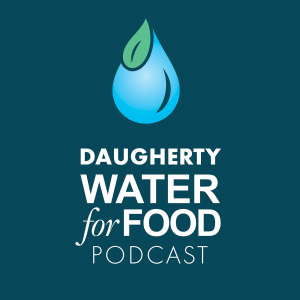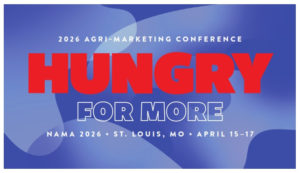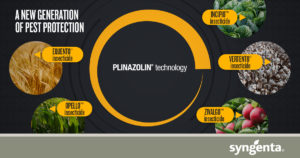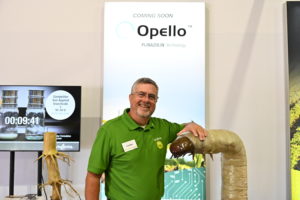DWFI Podcast 48 – A Decade of Daugherty Water for Food Leadership
 In this special episode, host Frances Hayes sits down with Peter McCornick, Executive Director of the Daugherty Water for Food Global Institute, as he concludes nearly a decade of leadership.
In this special episode, host Frances Hayes sits down with Peter McCornick, Executive Director of the Daugherty Water for Food Global Institute, as he concludes nearly a decade of leadership.
This deep-dive conversation covers Peter’s distinguished career, from his early life on a farm in Scotland and pivotal international work in Africa, Asia, and the Middle East, to what drew him to lead the Institute in Nebraska. They discuss DWFI’s greatest strategic achievements, the lasting impact of its work both globally and within Nebraska’s agricultural community, and the philosophy behind investing in student research. Finally, they tackle the most urgent challenges facing water and food security in the next decade and the legacy Peter hopes to leave behind.
Join us for a look back at institutional growth and a look ahead at the future of global innovation for a water and food secure world.
Listen here or subscribe on your favorite podcast platform:
The Robert B. Daugherty Water for Food Global Institute (DWFI) at the University of Nebraska was founded with the mission to have a lasting and significant impact on achieving more food security with less pressure on scarce water resources by conducting scientific and policy research, using the research results to inform policy makers, and sharing knowledge through education and communication.
How to subscribe:
Inspire Expands Food and Ag Practice with Leadership Additions
 Full-service, Ohio-based national agency Inspire has hired new leadership to expand the agency’s agriculture and food practice and its capacity to grow in the industry.
Full-service, Ohio-based national agency Inspire has hired new leadership to expand the agency’s agriculture and food practice and its capacity to grow in the industry.
Emily Sword and Meg Becker bring unmatched experience and expert counsel that will benefit clients. They are immediately adding value by providing enhanced expertise in reputation management, industry partnerships, research-driven storytelling, and integrated marketing strategy—tailored to the unique demands of production agriculture, animal health, crop science, and food manufacturers and suppliers.
 As Vice President, Sword leads strategy and account management for Inspire’s agriculture sector. As part of a fifth-generation farm family, Sword combines deep ag sector insight with more than 20 years of experience in corporate PR, brand strategy, and strategic communications helping brands earn trust, influence stakeholders, and drive measurable growth. Sword has guided organizations through brand transformations, stakeholder engagement challenges, and large-scale marketing initiatives that unite purpose and performance.
As Vice President, Sword leads strategy and account management for Inspire’s agriculture sector. As part of a fifth-generation farm family, Sword combines deep ag sector insight with more than 20 years of experience in corporate PR, brand strategy, and strategic communications helping brands earn trust, influence stakeholders, and drive measurable growth. Sword has guided organizations through brand transformations, stakeholder engagement challenges, and large-scale marketing initiatives that unite purpose and performance.
 · Becker serves the agency as a Senior Director, where she leverages her livestock and production agriculture background to aid food and agriculture clients in building trust, elevating brands, and engaging B2B and B2C audiences with clarity and purpose. With over 10 years of agency and in-house expertise, Becker has developed and executed strategic marketing and PR strategies for a variety of brands across agriculture commodity groups, packer processors, food ingredient companies, and animal nutrition experts.
· Becker serves the agency as a Senior Director, where she leverages her livestock and production agriculture background to aid food and agriculture clients in building trust, elevating brands, and engaging B2B and B2C audiences with clarity and purpose. With over 10 years of agency and in-house expertise, Becker has developed and executed strategic marketing and PR strategies for a variety of brands across agriculture commodity groups, packer processors, food ingredient companies, and animal nutrition experts.
Sword and Becker join a leadership team and deep bench of talented agriculture communicators that are committed to telling the stories of America’s farmers. O’Dwyers PR News ranked Inspire among the top five of agriculture firms in the U.S. earlier this year, and the agency was recently named to Ragan PR Daily’s Top Agencies of the Year list.
Learn more about Inspire’s food and agriculture experience and view case studies at InspirePRGroup.com/Agriculture.
Trump Announces Bridge Payments for American Farmers
 During a Monday round table with cabinet members, farmers and lawmakers, President Donald Trump announced the U.S. Department of Agriculture (USDA) will make $12 billion available in one-time bridge payments to American farmers in response to temporary trade market disruptions and increased production costs.
During a Monday round table with cabinet members, farmers and lawmakers, President Donald Trump announced the U.S. Department of Agriculture (USDA) will make $12 billion available in one-time bridge payments to American farmers in response to temporary trade market disruptions and increased production costs.
President Trump said the $12 billion represents a relatively small portion of what the United States is making on tariffs. “We’re going to be providing it to the farmers in economic assistance because, you know we love our farmers,” said Trump. “The relief will provide much needed certainty to farmers as they get this year’s harvest to market and look ahead to next year’s crops.”
Of the $12 billion provided, up to $11 billion will be used for the Farmer Bridge Assistance (FBA) Program for farmers who produce Barley, Chickpeas, Corn, Cotton, Lentils, Oats, Peanuts, Peas, Rice, Sorghum, Soybeans, Wheat, Canola, Crambe, Flax, Mustard, Rapeseed, Safflower, Sesame, and Sunflower. The remaining $1 billion of the $12 billion in bridge payments will be reserved for commodities not covered in the FBA Program such as specialty crops and sugar.
Those in attendance with the president during the announcement included Secretary of the Treasury Scott Bessent, Secretary of Agriculture Brooke Rollins, Senate Agriculture Committee Chairman John Boozman (R-AR), Senator Deb Fischer (R-NE), Senator John Hoeven (R-ND), Representative Austin Scott (R-GA), Iowa farmer Cordt Holub and Lousiana rice producer Meryl Kennedy.
Pres. Trump farmer aid announcement 30:07Industry Ag News 12/8
BioLumic Expanding Seed Trait Platform to South America
![]() BioLumic is expanding its light-activated seed trait platform into South America.
BioLumic is expanding its light-activated seed trait platform into South America.
Biolumic, which programs heritable seed traits using light, has announced steps to expand its Corn xTraits™ Licensing Program, including early-stage evaluations with GDM and a collaboration with Tropical Melhoramento & Genética (TMG), two of Brazil’s leading seed companies, along with regional seed production and nursery engagement with Gro Alliance. The move builds on strong partnership and commercial momentum of xTraits in the United States, and follows BioLumic’s plan to create xTraits hubs in grain-producing regions worldwide.
“To meet the global demand and reach of innovative seed partners and their customers, South American deployment is essential,” said Steve Sibulkin, CEO of BioLumic. “Our seed partners see an opportunity to drive higher performance in a fraction of the time and cost of alternative approaches.”
GDM’s current engagement is focused on testing BioLumic’s technology within its own genetics as part of early-stage evaluations. BioLumic will leverage TMG’s regional breeding expertise to accelerate field evaluation and adapt its xTraits Platform for South America’s top-producing corn regions. Grupo Scheffer, one of Brazil’s largest agricultural producers and a preferred customer of TMG, will also run multi-location field evaluations across its testing network including Mato Grosso and surrounding grain geographies. This alignment between seed companies and one of their major customers creates a direct pathway to validate BioLumic corn xTraits and to ensure regional farmers get access to these types of innovations through trusted partners.
Sibulkin says they are currently evaluating the inbred germplasm provided by its Brazilian partners, with field evaluations and hybrid nursery production scheduled for 2026. “These light-activated hybrids will be tested across both the first “Safra” and second “Safrinha” growing seasons to evaluate performance across Brazil’s major growing cycles and key grain-producing regions, including partner-aligned test locations,” said Sibulkin. Data generated through 2026 and into 2027 will support commercial launch timing aligned to partner strategies for bringing new corn xTraits to market. The company expects future expansion into soybean and ryegrass across Latin America in the near future.
Learn more in this interview with Sibulkin.
Steve Sibulkin, BioLumic CEO 14:12
NAMA is Hungry For More in 2026
 Satisfy your appetite for big ideas at the 2026 Agri-Marketing Conference — Hungry for More! Get registered.
Satisfy your appetite for big ideas at the 2026 Agri-Marketing Conference — Hungry for More! Get registered.
Join us on April 15–17 in St. Louis, MO, for three days of innovation, inspiration and expert industry insights designed to fuel your marketing mindset.
This year’s conference serves up a mix of thought-provoking sessions, valuable networking opportunities, and — NEW this year! — roundtable discussion “table talks” to dive into hot topics and collaborate on real-world solutions.
Register by December 31 and you’ll be entered for a chance to win FREE registration to the conference! If you’re selected, you can either keep the refund for yourself or share the free registration with someone you’d like to bring along.
Precision Ag News 12/4
Syngenta Announces EPA Approval for PLINAZOLIN Technology
 Syngenta’s PLINAZOLIN® technology has received registration from the Environmental Protection Agency and is now available for use, subject to state approvals. PLINAZOLIN technology will power five separate insecticide products for use in corn, cotton, vegetables, tree fruit, cereals and more.
Syngenta’s PLINAZOLIN® technology has received registration from the Environmental Protection Agency and is now available for use, subject to state approvals. PLINAZOLIN technology will power five separate insecticide products for use in corn, cotton, vegetables, tree fruit, cereals and more.
Growers can purchase the new active ingredient for the 2026 growing season as a seed treatment, soil-applied insecticide or foliar-applied insecticide. Products powered by PLINAZOLIN technology are available for purchase under the following brand names:
Opello™: This soil-applied insecticide provides revolutionary control of corn rootworm, consistently helping corn yield up to 27 bu/A more than untreated, while its highly tank-mix compatible formulation allows growers to leave equipment clogs and slowdowns in the past.
Equento®: This insecticide seed treatment offers a flexible and compatible option to terminate wireworms and suppress other below-ground pests, ultimately improving plant stand and helping a grower’s bottom line.
Vertento®: One of the toughest insect pest fighters in its class, this foliar-applied insecticide for cotton, peanuts and onions delivers a fast-acting, knockout punch to insect pests including plant bugs, thrips and mites.
Incipio™: With impressive residual strength to take the guesswork out of insect control, this foliar-applied insecticide for brassica, leafy, fruiting vegetable and cucurbit crops delivers a heavy-duty takedown of tough insect pests.
Zivalgo™: This foliar-applied insecticide can lead the way for potato and tree fruit insect pest management with unmatched, broad-spectrum control of Colorado potato beetles, codling moth, citrus thrips, spider mites and more.
 Syngenta National Executive Agronomist Craig Abell gave a preview of what Opello™ soil-applied insecticide with PLINAZOLIN® technology had to offer at the 2025 Farm Progress Show way back in August.
Syngenta National Executive Agronomist Craig Abell gave a preview of what Opello™ soil-applied insecticide with PLINAZOLIN® technology had to offer at the 2025 Farm Progress Show way back in August.
“It’s an in-furrow application at planting time. It’s very flexible to use. You can use water as a carrier. You can use starter fertilizer, pop-up fertilizer. We haven’t found anything that it’s not compatible with as of yet,” said Abell. “As we look at existing insecticides and also traits, this is a tool to take pressure off of both of those.”
Learn more in this interview from Farm Progress Show.
FPS25 Interview with Craig Abell, Syngenta agronomist (3:16)



